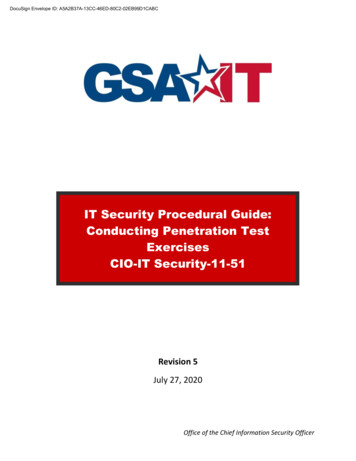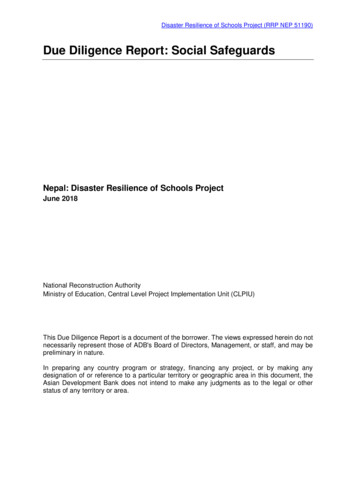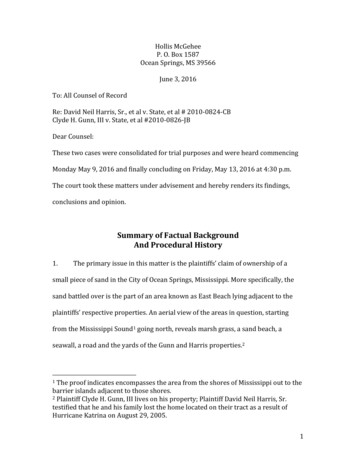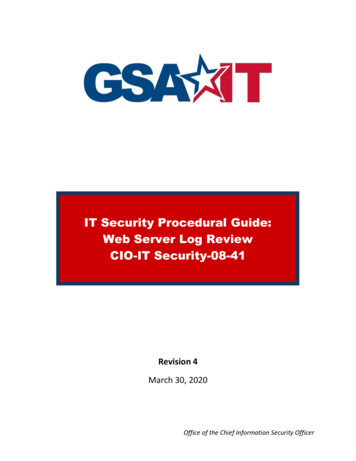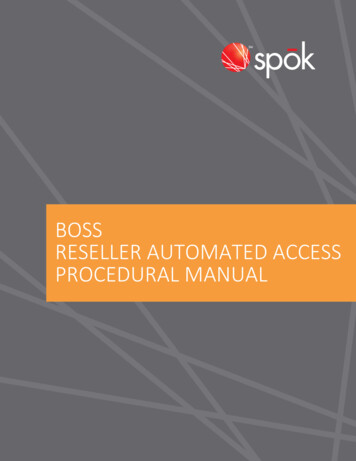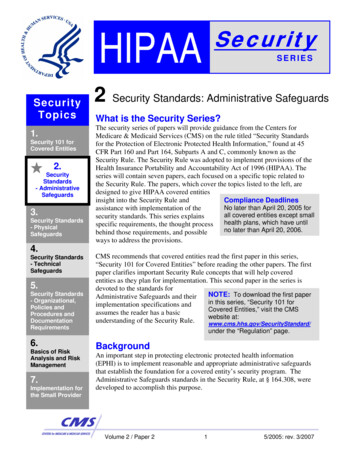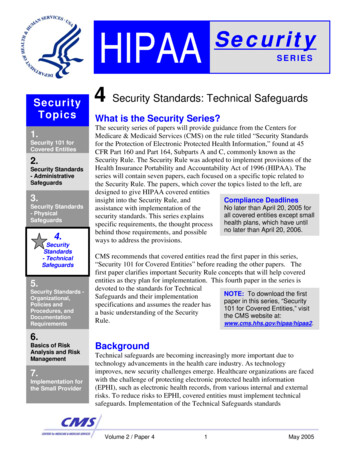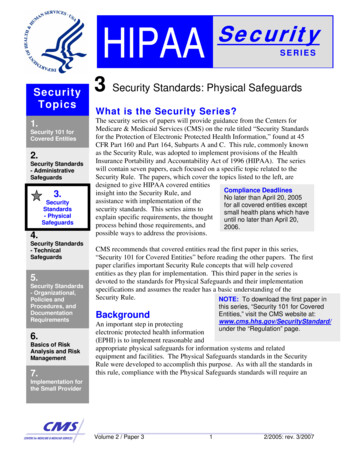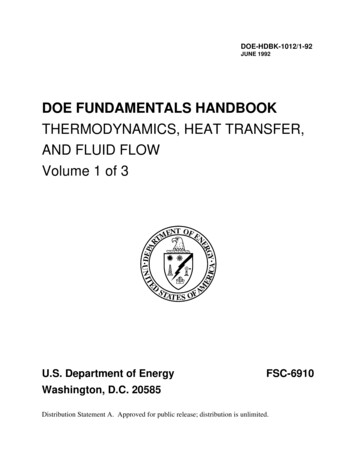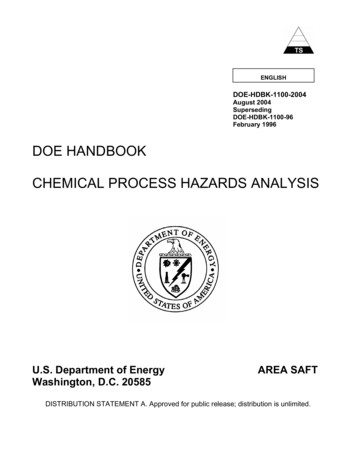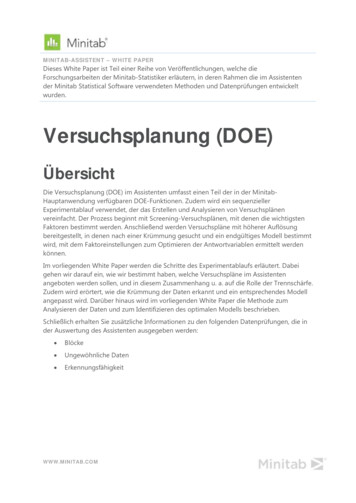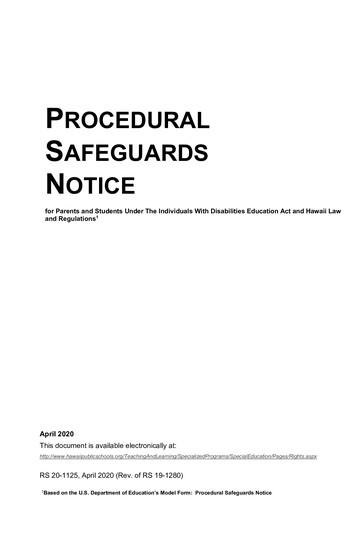
Transcription
PROCEDURALSAFEGUARDSNOTICEfor Parents and Students Under The Individuals With Disabilities Education Act and Hawaii Lawand Regulations1April 2020This document is available electronically /Rights.aspxRS 20-1125, April 2020 (Rev. of RS 19-1280)1Basedon the U.S. Department of Education’s Model Form: Procedural Safeguards Notice
Part BPROCEDURAL SAFEGUARDS NOTICEAugust 2011The Individuals with Disabilities Education Act (IDEA), the Federal law, and Hawaii law andregulations (Hawaii Administrative Rules [HAR], Title 8, Chapter 60, Provision of a FreeAppropriate Public Education for a Student with a Disability) concerning the education ofstudents with disabilities, requires schools to provide you, the parents of a student with adisability, with a notice containing a full explanation of the procedural safeguards availableunder IDEA and U.S. Department of Education regulations, and Hawaii law and regulations(HAR §8-60-59). A copy of this notice must be given to you only one time a school year,except that a copy must also be given to you: (1) upon initial referral or your request forevaluation; (2) upon receipt of your first State complaint (under 34 Code of FederalRegulations [CFR] §§300.151 through 300.153 and HAR §§8-60-52 through 8-60-54) andupon receipt of your first due process complaint (under 34 CFR §300.507 and HAR §8-60-61)in a school year; (3) when a decision is made to take a disciplinary action against your childthat constitutes a change of placement; and (4) upon your request [34 CFR §300.504(a) andHAR §8-60-59(a)].This procedural safeguards notice includes a full explanation of all of the proceduralsafeguards available under:34 CFR §300.148 and HAR §8-60-27 (unilateral placement of a student in a private school atpublic expense);34 CFR §§300.151 through 300.153 and §§8-60-52 through 8-60-54 (State ComplaintProcedures);34 CFR §300.300 and HAR §8-60-31 (Parental consent);34 CFR §§300.502 and 300.503 and HAR §§8-60-57 (Independent educational evaluation)and 8-60-58 (prior written notice);34 CFR §§300.505 through 300.518 and HAR §§8-60-60 through 8-60-72 (other proceduralsafeguards);34 CFR §§300.530 through 300.536 and HAR §§8-60-75 through 8-60-81 (DisciplineProcedures); and34 CFR §§300.610 through 300.625 and HAR §8-60-84 (Confidentiality of Information).
Part B Procedural Safeguards NoticeiTable of ContentsGeneral Information. 1Prior Written Notice . 1Native Language---Definition. 2Parental Consent---Definition . 2Parental Consent . 3Independent Educational Evaluations . 5Confidentiality of Information. 7Definitions . 7Personally Identifiable . 7Notice to Parents . 7Access Rights . 8Record of Access . 8Records on More Than One Student. 8List of Types and Locations of Information . 9Fees . 9Amendment of Records at Parent’s Request . 9Opportunity for a Hearing . 9Hearing Procedures . 9Result of Hearing . 10Consent For Disclosure of Personally Identifiable Information . 10Safeguards . 10Destruction of Information . 11State Complaint Procedures. 12Differences Between the Procedures for Due Process Complaints andHearings and for State Complaints . 12Adoption of State Complaint Procedures . 12Minimum State Complaint Procedures . 13Filing a State Complaint . 14Due Process Complaint Procedures . 16Filing a Due Process Complaint . 16Due Process Complaint. 16Model Forms . 18Mediation. 18Resolution Process . 20Hearings on Due Process Complaints . 22Impartial Due Process Hearing . 22Hearing Rights . 23Hearing Decisions . 24
Part B Procedural Safeguards NoticeAppeals. 25Finality of Decision; Appeal; Impartial Review. 25Timelines and Convenience of Hearings and Reviews . 25Civil Actions, Including the Time Period in Which to File Those Actions . 26The Student’s Placement While the Due Process Complaint and Hearing arePending . 27Attorneys’ Fees . 27Procedures When Disciplining Students with Disabilities. 30Authority of School Personnel . 30Change of Placement Because of Disciplinary Removals . 33Determination of Setting . 33Appeal . 34Placement During Appeals . 35Protections for Students Not Yet Eligible for Special Education and RelatedServices . 35Referral to and Action by Law Enforcement and Judicial Authorities . 36Requirements for Unilateral Placement by Parents of Students in Private Schoolsat Public Expense . 37General . 37Transfer of Rights . 39ii
Part B Procedural Safeguards Notice1GENERAL INFORMATIONPRIOR WRITTEN NOTICE34 CFR §300.503HAR §8-60-58NoticeThe Hawaii Department of Education (Department) must give you written notice (provide youcertain information in writing), within a reasonable amount of time before it:1. Proposes to initiate or to change the identification, evaluation, or educational placementof your child, or the provision of a free appropriate public education (FAPE) to yourchild; or2. Refuses to initiate or to change the identification, evaluation, or educational placementof your child, or the provision of FAPE to your child.Content of noticeThe written notice must:1. Describe the action that the Department proposes or refuses to take;2. Explain why the Department is proposing or refusing to take the action;3. Describe each evaluation procedure, assessment, record, or report the Departmentused in deciding to propose or refuse the action;4. Include a statement that you have protections under the procedural safeguardsprovisions in Part B of the Individuals with Disabilities Education Act (IDEA) and Hawaiilaw and regulations for special education (HAR 8-60), and if this notice is not an initialreferral for evaluation, the means by which a copy of HAR §8-60-59 (proceduralsafeguards notice) can be obtained;5. Include resources for you to contact for help in understanding Part B of IDEA andprovisions of HAR 8-60.6. Describe any other options that your child's Individualized Education Program (IEP)Team considered and the reasons why those options were rejected; and7. Provide a description of other reasons why the Department proposed or refused theaction.Notice in understandable languageThe notice must be:1. Written in language understandable to the general public; and2. Provided in your native language or other mode of communication you use, unless it isclearly not feasible to do so.If your native language or other mode of communication is not a written language, theDepartment must ensure that:
Part B Procedural Safeguards Notice21. The notice is translated for you orally or by other means in your native language orother mode of communication;2. You understand the content of the notice; and3. There is written evidence that the requirements in paragraphs 1 and 2 have been met.NATIVE LANGUAGE - DEFINITION34 CFR §300.29HAR §8-60-2Native language, when used regarding an individual who has limited English proficiency,means the following:1. The language normally used by that person, or, in the case of a student, the languagenormally used by the student's parents;2. In all direct contact with a student (including evaluation of the student), the languagenormally used by the student in the home or learning environment.For a person with deafness or blindness, or for a person with no written language, the mode ofcommunication is what the person normally uses (such as sign language, Braille, or oralcommunication).PARENTAL CONSENT - DEFINITION34 CFR §300.9HAR §8-60-2Consent means:1. You have been fully informed in your native language or other mode of communication(such as sign language, Braille, or oral communication) of all information about theaction for which you are giving consent.2. You understand and agree in writing to that action, and the consent describes thataction and lists the records (if any) that will be released and to whom; and3. You understand that the consent is voluntary on your part and that you may withdrawyour consent at any time.If you wish to revoke (cancel) your consent after your child has begun receiving specialeducation and related services, you must do so in writing. Your withdrawal of consent doesnot negate (undo) an action that has occurred after you gave your consent but before youwithdrew it. In addition, the school is not required to amend (change) your child’s educationrecords to remove any references that your child received special education and relatedservices after your withdrawal of consent.
Part B Procedural Safeguards Notice3PARENTAL CONSENT34 CFR §300.300HAR §8-60-31Consent for initial evaluationThe Department cannot conduct an initial evaluation of your child to determine whether yourchild is eligible under Part B of IDEA to receive special education and related services withoutfirst providing you with prior written notice (PWN) of the proposed action and obtaining yourconsent (when assessments are required as part of the evaluation) as described under theheadings Prior Written Notice and Parental Consent.The Department must make reasonable efforts to obtain your informed consent for an initialevaluation to decide whether your child is a student with a disability.Your consent for initial evaluation does not mean that you have also given your consent for theschool to start providing special education and related services to your child.The Department may not use your refusal to consent to one service or activity related to theinitial evaluation as a basis for denying you or your child any other service, benefit, or activity,unless another Part B requirement of IDEA requires the Department to do so.If your child is enrolled in public school or you are seeking to enroll your child in a public schooland you have refused to provide consent or failed to respond to a request to provide consentfor an initial evaluation, the Department may, but is not required to, seek to conduct an initialevaluation of your child by using the IDEA's mediation or due process complaint, resolutionmeeting, and impartial due process hearing procedures. The Department will not violate itsobligations to locate, identify and evaluate your child if it does not pursue an evaluation of yourchild in these circumstances.Special rules for initial evaluation of wards of the StateWard of the State, as used in IDEA & HAR 8-60, means a student who, as determined by theState where the student lives, is:1. A foster child;2. Considered a ward of the State under State law; or3. In the custody of a public child welfare agency.There is one exception that you should know about. Ward of the State does not include a fosterchild who has a foster parent who meets the definition of a parent as used in IDEA andHAR 8-60.If a student is a ward of the State and is not living with his/her parent - the Department doesnot need consent from the parent for an initial evaluation to determine if the student is astudent with a disability if:1. Despite reasonable efforts to do so, the Department cannot find the student’s parent;2. The rights of the parents have been terminated in accordance with Hawaii law; or3. A judge has assigned the right to make educational decisions to an individual other thanthe parent and that individual has provided consent for an initial evaluation.
Part B Procedural Safeguards Notice4Parental consent for servicesThe Department must obtain your informed consent before providing special education andrelated services to your child for the first time.The Department must make reasonable efforts to obtain your informed consent beforeproviding special education and related services to your child for the first time.If you do not respond to a request to provide your consent for your child to receive specialeducation and related services for the first time, or if you refuse to give such consent or laterrevoke (cancel) your consent in writing, the Department may not use the proceduralsafeguards (i.e., mediation, due process complaint, resolution meeting, or an impartial dueprocess hearing) in order to obtain agreement or a ruling that the special education and relatedservices (recommended by your child's IEP Team) may be provided to your child without yourconsent.If you refuse to give your consent for your child to receive special education and relatedservices for the first time, or if you do not respond to a request to provide such consent or laterrevoke (cancel) your consent in writing and the Department does not provide your child withthe special education and related services for which it sought your consent, the Department:1. Is not in violation of the requirement to make FAPE available to your child for its failureto provide those services to your child; and2. Is not required to have an IEP meeting or develop an IEP for your child for the specialeducation and related services for which your consent was requested.If you revoke (cancel) your consent in writing at any point after your child is first providedspecial education and related services, then the Department may not continue to provide suchservices, but must provide you with a PWN, as described under the heading Prior WrittenNotice, before discontinuing those services.Parental consent for reevaluationsThe Department must obtain your informed consent before it reevaluates your child, unless theDepartment can demonstrate that:1. It took reasonable steps to obtain your consent for your child's reevaluation; and2. You did not respond.If you refuse to consent to your child's reevaluation, the Department may, but is not requiredto, pursue your child's reevaluation by using the mediation, due process complaint, resolutionmeeting, and impartial due process hearing procedures to seek to override your refusal toconsent to your child's reevaluation. As with initial evaluations, the Department does notviolate its obligations under Part B of IDEA if it declines to pursue the reevaluation in thismanner.Documentation of reasonable efforts to obtain parental consentYour school must maintain documentation of reasonable efforts to obtain your consent forinitial evaluations, to provide special education and related services for the first time, for areevaluation, and to locate parents of wards of the State for initial evaluations. Thedocumentation must include a record of the Department’s attempts in these areas, such as:1. Detailed records of telephone calls made or attempted and the results of those calls;
Part B Procedural Safeguards Notice52. Copies of correspondence sent to you and any responses received; and3. Detailed records of visits made to your home or place of employment and the results ofthose visits.Other consent requirementsYour consent is not required before the Department may:1. Review existing data as part of your child's evaluation or a reevaluation; or2. Give your child a test or other evaluation that is given to all students unless, before thattest or evaluation, consent is required from parents of all students.If you have enrolled your child in a private school at your own expense or if you are homeschooling your child, and you do not provide your consent for your child's initial evaluation oryour child's reevaluation, or you fail to respond to a request to provide your consent, theDepartment may not use its dispute resolution procedures (i.e., mediation, due processcomplaint, resolution meeting, or an impartial due process hearing) and is not required toconsider your child as elig
2. In all direct contact with a student (including evaluation of the student), the language normally used by the student in the home or learning environment. For a person with deafness or blindness, or for a person with no written language, the mode of communication is what the pers
